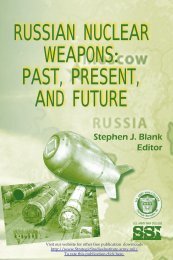The United States and China in Power Transition - Strategic Studies ...
The United States and China in Power Transition - Strategic Studies ...
The United States and China in Power Transition - Strategic Studies ...
Create successful ePaper yourself
Turn your PDF publications into a flip-book with our unique Google optimized e-Paper software.
voked <strong>Ch<strong>in</strong>a</strong>’s attack by press<strong>in</strong>g the <strong>in</strong>dependence<br />
agenda, it should not expect the <strong>United</strong> <strong>States</strong> to come<br />
to its defense; but if <strong>Ch<strong>in</strong>a</strong> lost its patience <strong>and</strong> forced<br />
unification upon Taiwan, the <strong>United</strong> <strong>States</strong> would <strong>in</strong>tervene.<br />
<strong>Strategic</strong>ally, President Bush had <strong>in</strong> essence<br />
removed all the ambiguities <strong>in</strong> the U.S. commitment.<br />
Operationally, the U.S. response will depend on how<br />
the situation goes.<br />
In the course of its development, the Taiwan issue<br />
has become a bizarre tug of war. On one end of the<br />
rope st<strong>and</strong>s <strong>Ch<strong>in</strong>a</strong>, determ<strong>in</strong>ed, focused, <strong>and</strong> mak<strong>in</strong>g<br />
every effort to pull Taiwan <strong>in</strong>to its fold. On the other<br />
end of the rope, there are two disoriented contestants,<br />
Taiwan <strong>and</strong> the <strong>United</strong> <strong>States</strong>, each hav<strong>in</strong>g an <strong>in</strong>ternal<br />
tug of war over the <strong>Ch<strong>in</strong>a</strong>-Taiwan issue.<br />
Inside Taiwan, it is a three-way situation. <strong>The</strong> DPP<br />
tries to pull Taiwan away from <strong>Ch<strong>in</strong>a</strong>. <strong>The</strong> Kuom<strong>in</strong>tang<br />
(KMT) st<strong>and</strong>s for eventual unification of Taiwan<br />
with <strong>Ch<strong>in</strong>a</strong>, not on <strong>Ch<strong>in</strong>a</strong>’s terms, but on democratic<br />
pr<strong>in</strong>ciples—<strong>Ch<strong>in</strong>a</strong> must become a democracy or the<br />
KMT will not lead Taiwan to jo<strong>in</strong> <strong>Ch<strong>in</strong>a</strong>.<br />
<strong>The</strong> 23 million Taiwan people are torn between<br />
these two parties. Repeated public op<strong>in</strong>ion polls <strong>in</strong> Taiwan<br />
show that except for a small percentage of steadfast<br />
pro-<strong>in</strong>dependence <strong>and</strong> pro-unification extremes,<br />
most people have to agree that the current status quo<br />
of de facto but not de jure <strong>in</strong>dependence is a choice of<br />
the lesser evil, because they underst<strong>and</strong> that outright<br />
promotion of formal Taiwan <strong>in</strong>dependence will provoke<br />
a war with <strong>Ch<strong>in</strong>a</strong>, whereas a compromised unification<br />
at this time is ask<strong>in</strong>g for trouble. Why submit<br />
to an authoritarian regime <strong>in</strong> Beij<strong>in</strong>g while they can<br />
enjoy democracy <strong>and</strong> freedom <strong>in</strong> Taiwan?<br />
<strong>The</strong> tug of war took a dramatic turn <strong>in</strong> 2008 when<br />
the KMT rega<strong>in</strong>ed control of the Taiwan govern-<br />
114

















